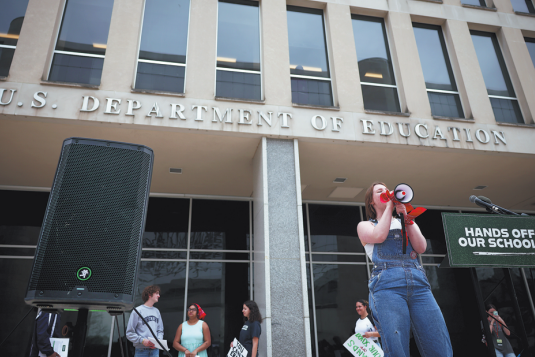Travel Pause
Students from Southeast Asia rethink education plans to US amid immigration crackdowns and policy shifts


Editor's note: In this weekly feature China Daily gives voice to Asia and its people. The stories presented come mainly from the Asia News Network (ANN), of which China Daily is among its 20 leading titles.
For months, 19-year-old Noah (not his real name) from Malaysia had been researching how to study marine biology in the United States: looking into visa rules, work opportunities and internships. But in April, he gave up on his decision.
"I had my heart set on Hawaii — some people call it the Disneyland for marine scientists," he said.
Countries such as Australia, Britain and the US have long been major overseas destinations for Southeast Asians. But there appears to be a growing sense of wariness among potential students and other travelers from the region about heading to the US.
Policy shifts under the Trump administration, including sharper scrutiny of international students and visa cancellations, amid an immigration crackdown have led to reassessments by would-be arrivals from Southeast Asia.
For Noah, the worries have meant pivoting to local options or considering Singapore and Australia. He declined to use his real name as a precaution in the event of future travel to the US.
"I have turned my eyes closer to home. Southeast Asia has incredible marine ecosystems too, and maybe this is a sign to root my work right here, where it matters most," he said.
Others have seen opportunities abruptly paused. A 28-year-old Malaysian participant in the Young Southeast Asian Leaders Initiative, who requested anonymity, said his five-week fellowship in the US was postponed without explanation in March.
Since January, more than 4,700 international student records have been removed from the Student and Exchange Visitor Program, a database managed by the US Immigration and Customs Enforcement, or ICE, according to Reuters and the American Immigration Lawyers Association.
The US Embassy in Jakarta reported 8,348 Indonesian students in the US for 2023-24, the second-highest figure from Southeast Asia, after Vietnam. But cases like that of Aditya Wahyu Harsono — a 33-year-old arrested by ICE agents at his workplace in Minnesota after his student visa was suddenly revoked — have caused ripples of concern.
The Indonesian embassy in Washington on April 12 urged students to closely monitor their visa status and digital footprint, and to stay compliant with all US regulations. Several Indonesian students have been detained or deported recently, including one in San Francisco, and others in Atlanta and New York.
As of April 24, around 20 Indonesian students across the US have been detained by ICE, with five of them deported.
Some Indonesian students in the US say they have stopped traveling outside of the country, even for academic events, to avoid reentry risks.
"During spring break, I noticed that people who returned to the US after internships or other activities were being questioned a lot by immigration officers, mostly friends from Arab or Palestinian backgrounds. They might be the main targets now," Edo (not his real name), a postgraduate student in New York, said. He also declined to be named in case of possible repercussions.
"There's now a lot of guidance circulating. Before going through immigration, students (from overseas) are advised to delete all social media, deactivate accounts and clean up (their) photo gallery," he said, pointing to groups like American Civil Liberties Union that are helping students avoid potential detention by ICE.
These developments come as the current US administration is poised to use the federal purse to force top universities like Columbia and Harvard to make sweeping policy changes, or lose grants and contracts, even as international student exchange programs, including Fulbright, face funding issues.
Trump administration also revoked Harvard University's ability to enroll international students on May 22, and is forcing current foreign students to transfer to other schools or lose their legal status, while also threatening to expand the crackdown to other colleges.
US Department of Homeland Security said on Thursday it would give Harvard University 30 days to prove it meets the requirements of the Student and Exchange Visitor Program, which authorizes universities to host academics on visas.
A 21-year-old Malaysian student is still mulling over an offer from a US university.
"As a brown Asian girl, I worry about my general safety and wellbeing if I were to reside in the US," she said, pointing to issues such as racism and the immigration crackdown, not to mention the political leanings of Arkansas in the deep south, where the university is located. Arkansas is a Republican state, whose voters helped Trump win a second term in the 2024 polls.

































